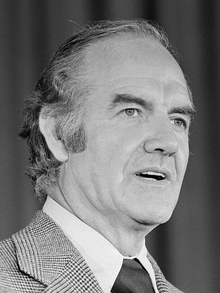George McGovern
| George McGovern | |
|---|---|
 |
|
|
United States Senator from South Dakota |
|
|
In office January 3, 1963 – January 3, 1981 |
|
| Preceded by | Joseph Bottum |
| Succeeded by | James Abdnor |
| United States Ambassador to the United Nations Agencies for Food and Agriculture | |
|
In office April 15, 1998 – October 19, 2001 |
|
| Appointed by | Bill Clinton |
| Preceded by | Laurie Tracy |
| Succeeded by | Tony Hall |
| Chair of the Senate Nutrition Committee | |
|
In office July 1968 – December 1977 |
|
| Preceded by | Committee established |
| Succeeded by | Committee abolished |
| Director of Food for Peace | |
|
In office January 21, 1961 – July 18, 1962 |
|
| President | John F. Kennedy |
| Preceded by | Position established |
| Succeeded by | Richard W. Reuter |
| Member of the U.S. House of Representatives from South Dakota's 1st district |
|
|
In office January 3, 1957 – January 3, 1961 |
|
| Preceded by | Harold Lovre |
| Succeeded by | Ben Reifel |
| Personal details | |
| Born |
George Stanley McGovern July 19, 1922 Avon, South Dakota, U.S. |
| Died | October 21, 2012 (aged 90) Sioux Falls, South Dakota, U.S. |
| Political party | Democratic |
| Spouse(s) | Eleanor Stegeberg (m. 1943; d. 2007) |
| Children | 5 |
| Education |
Dakota Wesleyan University (BA) Garrett Evangelical Theological Seminary Northwestern University (MA, PhD) |
| Religion | Methodist |
| Signature | |
| Military service | |
| Allegiance |
|
| Service/branch |
|
| Years of service | 1943–1945 |
| Rank |
|
| Unit |
741st Bomb Squadron 455th Bombardment Group 15th Air Force |
| Battles/wars |
World War II • European Theatre |
| Awards |
Distinguished Flying Cross Air Medal (3) |
George Stanley McGovern (July 19, 1922 – October 21, 2012) was an American historian, author, U.S. Representative, U.S. Senator, and the Democratic Party presidential nominee in the 1972 presidential election.
McGovern grew up in Mitchell, South Dakota, where he was a renowned debater. He volunteered for the U.S. Army Air Forces upon the country's entry into World War II and as a B-24 Liberator pilot flew 35 missions over German-occupied Europe. Among the medals bestowed upon him was a Distinguished Flying Cross for making a hazardous emergency landing of his damaged plane and saving his crew. After the war he gained degrees from Dakota Wesleyan University and Northwestern University, culminating in a PhD, and was a history professor. He was elected to the U.S. House of Representatives in 1956 and re-elected in 1958. After a failed bid for the U.S. Senate in 1960, he was a successful candidate in 1962.
As a senator, McGovern was an exemplar of modern American liberalism. He became most known for his outspoken opposition to the growing U.S. involvement in the Vietnam War. He staged a brief nomination run in the 1968 presidential election as a stand-in for the assassinated Robert F. Kennedy. The subsequent McGovern–Fraser Commission fundamentally altered the presidential nominating process, by greatly increasing the number of caucuses and primaries and reducing the influence of party insiders. The McGovern–Hatfield Amendment sought to end the Vietnam War by legislative means but was defeated in 1970 and 1971. McGovern's long-shot, grassroots-based 1972 presidential campaign found triumph in gaining the Democratic nomination but left the party badly split ideologically, and the failed vice-presidential pick of Thomas Eagleton undermined McGovern's credibility. In the general election McGovern lost to incumbent Richard Nixon in one of the biggest landslides in American electoral history. Re-elected Senator in 1968 and 1974, McGovern was defeated in a bid for a fourth term in 1980.
...
Wikipedia
